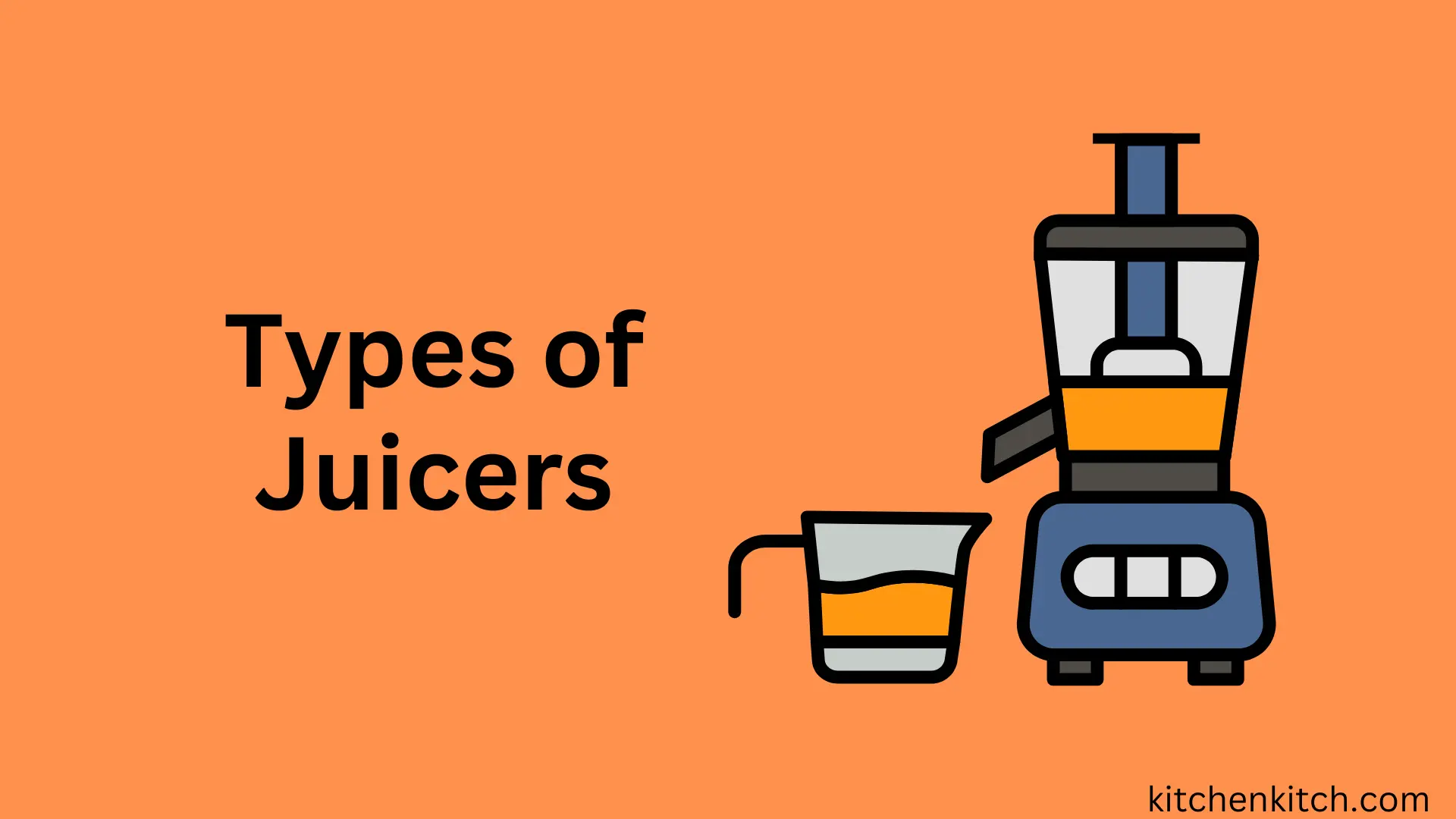Types of Juicers
A juicer is a handy gadget in the kitchen that helps you squeeze out juice from fruits and vegetables. It’s like having a magic potion maker right on your countertop! Nowadays, there are so many types of juicers available, each with its special features and functions. Some can even make yummy nuts or soy milk! Juicing has become super popular because it’s a simple way to get all the goodness from your favorite fruits and veggies in a gulp.
So, let’s explore the different types of juicers in this guide.
Types of Juicers
Centrifugal Juicers
In the realm of juicing, centrifugal juicers reign supreme as the swift and budget-friendly option for extracting liquid gold from fruits and vegetables. Picture this: a sleek machine with a high-speed spinning blade eagerly awaiting its next task. As you feed your chosen produce into the juicer’s tube, the magic begins. The blade, armed with teeth like a miniature warrior, swiftly shreds the fruits and vegetables into tiny fragments. Then, as if by some centrifugal wizardry, the spinning force propels the juice away from the pulp, ready to be collected in a waiting receptacle.
These juicers are the darlings of the kitchen for many reasons. First and foremost, they are wallet-friendly, making them an ideal choice for those just dipping their toes into the world of juicing. Moreover, they are incredibly user-friendly, sparing you the hassle of complex operations. With a centrifugal juicer, you can whip up your favorite concoctions in mere minutes, a boon for busy individuals seeking a quick nutrient boost.
However, as with any hero, centrifugal juicers have their Achilles’ heel. Their high-speed blades, while efficient, can pose challenges when dealing with softer fruits or leafy greens. One wrong move and your kitchen could resemble a produce tornado! Furthermore, the intense spinning generates heat and friction, which, unfortunately, can lead to the loss of precious flavor, enzymes, and nutrients.
In summary, centrifugal juicers offer speed, affordability, and convenience, making them a popular choice for juicing enthusiasts worldwide. Just remember to tread carefully with delicate ingredients, and you’ll be well on your way to enjoying a glass of freshly squeezed goodness in no time.
Pros:
- Lightning-fast juice extraction saves valuable time.
- Simple operation caters to users of all skill levels.
- Budget-friendly price tag appeals to thrifty shoppers.
- A wide feeding tube accommodates whole fruits and veggies, minimizing prep work.
- Easy cleanup ensures hassle-free maintenance.
- Versatile capabilities allow for a variety of juicing adventures.
Cons:
- Can be noisy during operation.
- Reduced nutrient retention due to heat and oxidation.
- Lower juice yield when processing softer produce.
Masticating Juicers
Enter the realm of masticating juicers, also known as slow juicers or cold pressers. These culinary marvels earn their monikers from their unhurried approach to extracting liquid gold from fruits and veggies. Imagine a gentle giant in your kitchen, patiently crushing and coaxing every drop of juice from its colorful bounty. Simply load your produce into the feeding tube, and watch as the auger or gear, ever so slowly, works its magic, delicately pressing and squeezing to yield pure, unadulterated juice.
The beauty of masticating juicers lies not only in their meticulous craftsmanship but also in the unparalleled quality of their output. Unlike their speedier counterparts, these juicers operate at a leisurely pace, ensuring minimal heat and oxidation. This gentle process preserves the precious nutrients and enzymes inherent in fresh produce, offering a healthful elixir with every sip.
While the upfront cost of acquiring a masticating juicer may give pause, rest assured that it’s a worthy investment in your well-being. With these juicers, you’ll experience a higher juice yield, maximizing the return on your culinary endeavors. Plus, their versatility knows no bounds, allowing you to explore a world of culinary creations beyond simple juices. From creamy nut milk to wholesome baby food and even homemade pasta, the possibilities are endless.
Yet, like any tool of the trade, masticating juicers have their limitations. Their leisurely pace, while advantageous for nutrient preservation, also means that juicing can be a time-consuming affair. Additionally, their larger footprint may pose a challenge for those with limited counter space. However, for those committed to harnessing the full potential of their produce, these minor inconveniences are a small price to pay for the unparalleled quality they deliver.
Pros:
- High juice yield ensures maximum extraction of nutrients.
- The gentle extraction process minimizes heat and oxidation, preserving vital nutrients and enzymes.
- Versatility extends beyond juicing to include a variety of culinary applications.
- Quiet operation allows for undisturbed kitchen tranquility.
- Extended shelf life of juices due to minimal heat and oxidation.
Cons:
- Slow operation can be time-consuming.
- Initial investment costs may be prohibitive for some.
- Large size requires ample counter space for storage.
Twin-Gear Juicers
Behold the twin-gear juicer, also known as the triturating juicer, a formidable force in the world of juicing. Similar in essence to its masticating cousin, the twin-gear juicer distinguishes itself with not one, but two interlocking gears, working in perfect harmony to extract every last drop of liquid gold from your fruits and veggies. Picture these gears as a dynamic duo, rotating at a leisurely pace to delicately crush and press the produce, coaxing out the juice while leaving behind the pulp.
What sets the twin-gear juicer apart is its unparalleled ability to preserve the integrity of nutrients and enzymes. Thanks to its gentle extraction process, this juicer delivers a potent elixir brimming with healthful goodness, enhancing your well-being with every sip.
But the benefits of twin-gear juicers don’t end there. These juicers boast a myriad of advantages, from their ability to yield a high volume of juice to their versatility in the kitchen. Plus, their whisper-quiet operation ensures that your juicing endeavors remain undisturbed.
Furthermore, twin-gear juicers often come equipped with a range of attachments, allowing you to expand your culinary horizons beyond mere juicing. From crafting homemade pasta to whipping up delectable nut butter, the possibilities are endless with these versatile appliances.
Of course, like any powerhouse appliance, twin-gear juicers have their drawbacks. Their initial cost may give pause to some, and their leisurely operation can be time-consuming. Additionally, their larger size may pose a challenge for those with limited kitchen space. However, for those committed to harnessing the full potential of their produce, these minor inconveniences pale in comparison to the transformative benefits they offer.
Pros:
- High juice yield ensures maximum extraction of nutrients.
- The gentle extraction process preserves vital nutrients and enzymes.
- Versatility extends beyond juicing to include a variety of culinary applications.
- Extended shelf life of juices due to minimal oxidation.
- Quiet operation allows for peaceful juicing sessions.
- Additional attachments enhance culinary creativity.
Cons:
- The higher initial cost may deter some buyers.
- Slower operations can be time-intensive.
- Requires ample counter space for storage.
Citrus Juicers
Picture a sunny morning, with a glass of freshly squeezed orange juice glistening on your breakfast table. This delightful scene owes its existence to the humble citrus juicer, a marvel of simplicity designed specifically for extracting the liquid sunshine from fruits like oranges, lemons, and grapefruits.
These juicers are ingeniously crafted with a straightforward design, featuring either a motorized reamer or a manual lever. With just a gentle press against the rotating cone, you can effortlessly extract every last drop of juice from your favorite citrus fruits.
The beauty of citrus juicers lies in their ease of use and efficiency. Whether you opt for a manual or electric model, extracting juice from citrus fruits is a breeze. Plus, their affordability makes them accessible to juicing enthusiasts of all budgets. Cleanup is a cinch too, ensuring that your juicing experience remains hassle-free from start to finish.
But perhaps the most compelling reason to embrace citrus juicers is the nutritional powerhouse they deliver. Packed with vitamins, minerals, and antioxidants, the juice extracted from citrus fruits offers a myriad of health benefits, from boosting your immune system to promoting radiant skin.
Furthermore, their compact size makes them perfect for on-the-go juicing adventures, whether you’re whipping up a refreshing drink at home or taking your juicer along for a picnic in the park.
Of course, citrus juicers aren’t without their limitations. Their functionality is limited to citrus fruits, so if you’re looking to juice other types of produce, you’ll need to invest in a different juicer. Additionally, extracting juice from citrus fruits typically requires manual labor, which may not appeal to everyone. You should also know if can you turn off the self-cleaning oven early.
Pros:
- Easy to use, making juicing a breeze.
- Efficient and convenient for extracting citrus fruits.
- Affordable, catering to juicing enthusiasts of all budgets.
- Simple cleanup ensures a hassle-free experience.
- Nutrient-rich juice promotes overall health and well-being.
- The portable design allows for juicing on the go.
Cons:
- Limited functionality to citrus fruits only.
- Requires manual labor for juice extraction.
Manual Juicers
In a world dominated by electric gadgets, manual juicers stand as stalwart symbols of simplicity and efficiency. These juicers rely on good old-fashioned elbow grease rather than fancy motors to get the job done, making them ideal for both home kitchens and small businesses alike.
Unlike their electric counterparts, manual juicers are compact and lightweight, making them a breeze to transport and store. Their simplicity extends to their operation as well, with no complex buttons or settings to fuss over. With just a few manual turns of a lever, crank, or squeeze, you can extract juice from your favorite fruits and vegetables with ease.
But don’t let their modest appearance fool you—manual juicers are versatile workhorses, capable of tackling a wide range of juicing tasks. Whether you’re craving a glass of freshly squeezed citrus juice or looking to whip up a batch of nutritious green juice, these trusty appliances have you covered.
One of the standout features of manual juicers is their affordability. With no expensive motors or electronic components to drive up the cost, these juicers offer a budget-friendly option for juicing enthusiasts of all stripes. Plus, their quiet operation ensures that your juicing sessions remain peaceful and undisturbed.
Yet, like any tool, manual juicers have their drawbacks. Their reliance on manual power means that juicing can be a time-consuming and physically demanding task. Additionally, the lack of automation may result in slightly inconsistent results compared to electric juicers. However, for those willing to put in the effort, the rewards of using a manual juicer are well worth it.
Pros:
- The affordable price makes them accessible to all.
- The portable design allows for easy transportation and storage.
- Quiet operation ensures a peaceful juicing experience.
- Simple to use and maintain, with no complex settings to navigate.
- Environmentally friendly, with no electricity consumption.
- Retains nutrients for a healthier juice.
Cons:
- Manual operation can be time-consuming and tiring.
- May produce slightly inconsistent results compared to electric juicers.
Factors to Consider When Choosing a Juicer
When selecting a juicer, there are several key factors to consider to ensure you find the perfect match for your juicing needs:
- Type of Juicer: Determine which type of juicer aligns with your preferences and requirements. Consider factors such as the types of produce you’ll be juicing most frequently, your budget, and the level of convenience you desire.
- Juicing Method: Decide whether you prefer a centrifugal juicer, masticating juicer, twin-gear juicer, citrus juicer, or manual juicer based on the specific juicing method each employs and how it aligns with your juicing goals.
- Juice Quality: Consider the quality of juice each juicer produces. Some juicers preserve more nutrients, enzymes, and antioxidants than others, leading to higher-quality juice with better flavor and nutritional value.
- Ease of Use: Evaluate the ease of use of each juicer, including factors such as assembly, operation, and cleanup. Choose a juicer that fits seamlessly into your daily routine and lifestyle.
- Juicing Speed: Assess the juicing speed of each juicer and consider how quickly you need to produce juice. Centrifugal juicers typically operate faster than masticating juicers, but they may sacrifice some nutrient retention in the process.
- Noise Level: Take into account the noise level of each juicer, especially if you plan to use it during early mornings or late evenings when noise may be a concern.
- Juice Yield: Consider the juice yield of each juicer, which refers to the amount of juice extracted from a given quantity of produce. Higher juice yield means less waste and more value from your ingredients.
- Durability and Build Quality: Look for juicers made from durable materials that can withstand frequent use and last for years to come. Read reviews and consider the reputation of the brand when assessing build quality.
- Size and Storage: Consider the size of the juicer and whether it will fit comfortably on your countertop or if you have sufficient storage space to accommodate it when not in use.
- Additional Features: Explore any additional features or attachments offered by each juicer, such as pulp control settings, multiple speed options, or included recipe books, to determine which best suits your needs and preferences.
By carefully considering these factors, you can select a juicer that aligns perfectly with your juicing habits, lifestyle, and preferences, ensuring a satisfying juicing experience for years to come.
Conclusion
In conclusion, the world of juicers offers a variety of options to suit every preference and lifestyle. Whether you prefer the convenience of a centrifugal juicer, the nutrient-rich output of a masticating juicer, the versatility of a twin-gear juicer, the simplicity of a citrus juicer, or the hands-on approach of a manual juicer, there’s a juicer out there for you. By carefully considering your juicing needs and priorities, you can find the perfect juicer to bring delicious, nutritious juices into your life for years to come.








